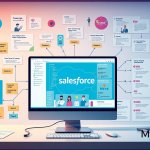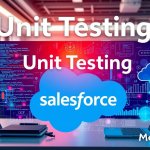
When I first entered the tech world, I felt overwhelmed by all the tools and platforms. A moment that stood out was when I found Salesforce. A seasoned developer shared tips on using Salesforce during a webinar. This sparked a hope in me, showing that I could grow in my career.
Today, after attending many Salesforce events and using Trailhead, I’ve learned a lot. I’ve also connected with other professionals. I found that a few simple strategies can greatly improve your skills in Apex programming and Lightning Web Components.
Key Takeaways
- Learn to adapt and grow within the evolving Salesforce ecosystem.
- Utilize quality resources available for free, like Trailhead.
- Engage with the Salesforce community for networking and support.
- Consider pursuing certifications to distinguish your expertise.
- Keep learning through various channels such as podcasts, blogs, and courses.
Understanding the Salesforce Ecosystem
The Salesforce ecosystem is a vast network that’s key in customer relationship management. It includes developers, administrators, and consultants. They all help make businesses more efficient and effective. Exploring the salesforce ecosystem shows how important it is for those looking to grow their skills.
Notably, Salesforce CRM holds a significant 24% market share. This large presence offers many career opportunities in salesforce. It’s expected to create 3.3 million jobs and bring in $859 billion in revenue by 2022. This shows that choosing a career in Salesforce could be very rewarding.
It’s crucial to understand how Salesforce works with other business processes and new technologies. This knowledge is key to reaching your full potential in the industry. The growth forecast of the Salesforce economy is promising, with an annual growth rate of 17%. This makes me excited about the future opportunities.
Looking into the different roles in the ecosystem, I see that over 70% of Salesforce customers use apps from the Salesforce AppExchange. This shows a lively space for developers and other professionals. With Salesforce’s growing importance, learning in-demand skills is more important than ever.
Why Grow Your Salesforce Development Skills?
As a Salesforce developer, I’ve learned how vital importance of Salesforce skills is today. Companies worldwide use Salesforce to manage their operations. This has created a high demand for skilled professionals. Growing my skills in Salesforce development has greatly boosted my career prospects.
The job market has changed a lot, especially with AI and new technologies. There are many ways to make myself more employable. This leads to better job security and higher salaries. The Salesforce ecosystem encourages continuous learning, including skills in Machine Learning and Generative AI.
Being part of the Salesforce community has given me access to mentors and valuable connections. I’ve used platforms like Trailhead to gain experience and get certifications. These certifications make me more attractive to employers. Soft skills like communication and leadership are also key for career growth in Salesforce.
Investing in my Salesforce skills has not only helped me grow professionally but also boosted my confidence. As I keep improving, I see endless possibilities for my career.
Do Your Research on Salesforce Development
Learning is key to improving my Salesforce development skills. I start by looking into the different roles in the Salesforce world. There are many paths, like developer, administrator, architect, and consultant. Knowing these options helps me focus my learning.
Explore Different Roles in Salesforce
Researching Salesforce roles shows me each job has its own set of skills and tasks. For example, developers are crucial for custom system integration and platform tweaks. They use tools like Apex code and Visualforce framework, needing strong programming skills.
With more companies needing Salesforce developers, having top technical skills helps me stand out.
Utilize Trailhead for Learning
Salesforce has a great tool called Salesforce Trailhead, a free online learning site. Trailhead lets me learn Salesforce through fun, interactive lessons. By completing these, I gain vital skills and earn badges to show off to employers.
Using Trailhead makes learning more engaging. It lets me plan my growth based on paths that match my career goals.
Having a Growth Mindset
Having a growth mindset is key in my Salesforce journey. The Salesforce platform is always changing, so I must keep learning. With three big updates every year, I stay focused on growing and learning.
Adapting to New Salesforce Features
Adapting to new Salesforce features means more than just knowing the latest tools. It’s about always learning. I regularly check my learning plans and make changes as needed. This keeps me up-to-date and helps me grow professionally.
Being part of the Salesforce community, going to training sessions, and using Trailhead are important for me. Getting Trailhead badges and superbadges is not just fun; it makes my resume stronger. It shows I’m ready to learn and grow, which is great for my career.
Leveraging the Salesforce Community
The Salesforce community is a treasure trove for developers looking to grow. It connects you with others who can mentor and share job leads. By joining in on discussions, you learn more and feel closer to the platform.
Networking with Fellow Salesforce Developers
Networking for Salesforce developers can be a real game changer. It builds a support system that helps you grow both personally and professionally. You can exchange ideas at online forums, local meetups, or big conferences, gaining new insights.
Participating in Trailblazer Community Events
Trailblazer community events are perfect for meeting peers and experts. They keep you updated on Salesforce trends and innovations. You get to connect with others and learn through hands-on workshops on new features and best practices.
Embracing Failure as a Learning Opportunity
In my Salesforce development journey, I’ve learned that learning from failure is key. Every setback teaches me something new. It pushes me to find new ways to solve problems.
By facing challenges, I get to rethink my plans. This makes me more adaptable and resilient.
Transforming Mistakes into Growth
When I make mistakes, I take time to understand why. This helps me grow from my errors. Analyzing mistakes in my projects or during certification prep gives me great insights.
It’s amazing how a small mistake can lead to big learning. Being part of a supportive community helps me learn more. It also builds strong bonds with my peers.
Salesforce Development Skills and Specializations
Exploring the Salesforce world, I find that mastering certain skills is key. Specializing in specific areas can make me stand out in a crowded job market. It’s important to find my Salesforce niche.
There are many options like Salesforce CPQ, Marketing Cloud, and Tableau. Each one needs unique skills that boost my job prospects.
Identifying Your Niche within Salesforce
Knowing about salesforce specializations is crucial for my career. For example, there’s a growing need for Marketing Cloud and Service Cloud experts. Each area has its own challenges and learning paths.
It’s important to find where my interests lie. With roles like Salesforce Lightning or custom app development in demand, I can align with market needs.
Consider Certifications for Career Advancement
Getting salesforce certifications is another smart move. These certifications prove my skills and can increase my salary. Whether it’s Marketing Cloud or data specialization, they show my dedication to Salesforce.
Continuous learning is essential for success. Keeping up with new features and best practices keeps me competitive in this fast-changing field.
Mastering Key Technologies: Apex and Lightning Web Components
As I explore Salesforce development, I see how crucial apex programming and lightning web components are. They’re not just trends; they’re key to unlocking Salesforce’s full potential.
Understanding Apex Programming Fundamentals
Apex programming is a powerful, object-oriented language. It lets developers create complex business logic. By learning its basics, I can work directly with the Salesforce database.
I can write triggers and perform data queries using SOQL and SOSL. This knowledge helps me write efficient code that works well with Salesforce APIs. Every time I learn more about apex programming, I find new ways to improve my apps.
Learning About Lightning Web Components
Lightning web components have changed how we build interfaces in Salesforce. This framework helps create fast, reusable components essential for modern web apps. Working with lightning web components boosts the user experience by using web standards.
Keeping up with lightning web components’ latest updates is crucial. It helps developers stay ahead in mastering Salesforce technologies.
Salesforce Integrations and Visualforce Pages
Exploring Salesforce development, I see how key integrations and visualforce pages are. They boost user experience and data handling. By linking Salesforce with other systems, I make information flow smoothly, meeting business needs.
Visualforce pages help me create custom interfaces. They make functions come alive.
Importance of Integration Skills
The world of Salesforce integrations is huge. Developers need strong skills to link Salesforce with other platforms. This includes connecting to external databases or integrating third-party apps.
Knowing how to integrate well boosts Salesforce’s power. It streamlines workflows and unifies data, leading to better business results.
Building Effective Visualforce Pages
Creating great visualforce pages mixes creativity with technical know-how. With over 150 built-in components, I can design interfaces that match our brand. The Developer Console offers tools like syntax highlighting and auto-suggestions, making coding easier.
I also use Salesforce Extensions for Visual Studio Code. This lets me work on Apex code and visualforce pages together. It makes developing dynamic apps more enjoyable.
Lighting web components work well with visualforce pages. They let me add new features easily. By following a few steps, I can use these components while keeping Salesforce’s design standards.
This flexibility is why I love working with visualforce. It lets me improve the user interface while using Salesforce’s features. Understanding these concepts is key to improving my Salesforce skills.
Salesforce App Development Best Practices
Exploring salesforce app development, I’ve learned that following best practices is key. It’s not just about coding. It’s about making processes smooth and improving user happiness. By doing this, I help both users and my team.
Implementing Efficient Workflow Solutions
Efficient workflows change my Salesforce projects for the better. Automating simple tasks lets me focus on harder problems. Tools like Process Builder and Flow boost productivity and cut down on mistakes.
Investors and clients love the quick, smooth app experiences. It makes their time with the app better.
Staying Current with AppExchange Innovations
Staying updated with AppExchange practices is essential for me. The AppExchange brings new tools and apps that can upgrade my work. Checking for updates regularly keeps me ahead.
This way, I can add new features that make my apps better. It ensures I always provide value to users.
Conclusion
Improving my Salesforce skills is a journey that needs a deep understanding of the ecosystem. I’ve learned how important it is to explore the Salesforce data model. Many developers moving from other platforms miss this, leading to code issues.
Learning about Apex triggers and Lightning Web Components has been key. They help me automate tasks and make user interfaces easy to use. This ensures data is handled and shown well.
The future of Salesforce looks bright, with fast changes and a need for constant learning. By staying updated and using community resources, I can keep up with new features and best practices. Writing test classes and using SOQL for data retrieval are just a few ways I improve my skills.
My focus on creating custom solutions in Salesforce boosts sales and marketing, customer service, and loyalty. As I keep learning and exploring, I realize that continuous learning is my biggest strength. It helps me use Salesforce’s full potential.
See how FieldAx can transform your Field Operations.
Try it today! Book Demo
You are one click away from your customized FieldAx Demo!
FAQ
What are the essential skills needed to become a Salesforce developer?
How can I get started with Salesforce Trailhead?
Why is a growth mindset important in Salesforce development?
How can I network with other Salesforce professionals?
What should I do if I fail a Salesforce certification exam?
What specializations should I consider as a Salesforce developer?
How important is it to stay updated with AppExchange innovations?
Author Bio
Co-Founder & CMO at Merfantz Technologies Pvt Ltd | Marketing Manager for FieldAx Field Service Software | Salesforce All-Star Ranger and Community Contributor | Salesforce Content Creation for Knowledge Sharing





